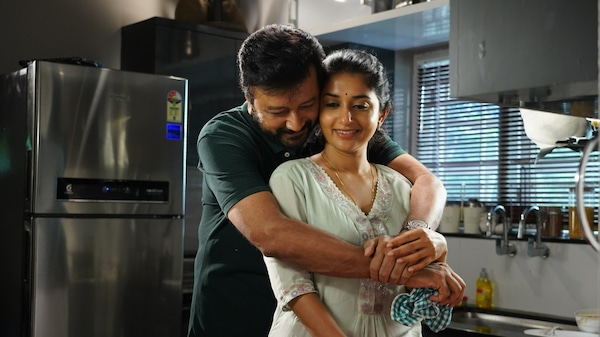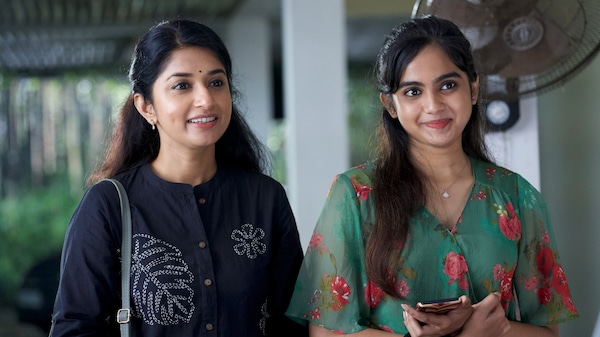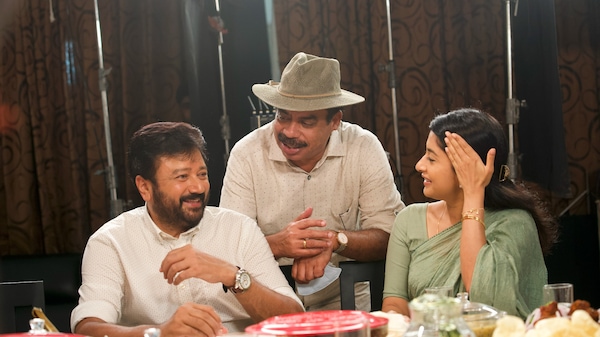Makal movie review: Jayaram, Meera Jasmine’s feel-good film has its moments but plays it too safe
Naslen's sequences succeed in in presenting the laugh-out-loud moments in the movie, which also has some heart-tugging sequences by Meera Jasmine and Kannada actor Balaji Manohar

Last Updated: 02.32 PM, Apr 29, 2022
Story: Mother and daughter duo Juliet and Aparna have been living together for the best part of their lives, enjoying their freedom and level of understanding. After Aparna’s father Nandan returns from the Gulf and Juliet gets a job, forcing her to move to another district, he now has to figure out his teenage daughter. While the generation gap leads to a series of misunderstandings and squabbles, the entry of an unexpected stranger becomes a reason for them to connect.
Review: If you take a look at some of Sathyan Anthikad’s films in the past decade, the filmmaker clearly seems to have followed a pattern, where his movies start off with a pertinent, interesting subject with liberal doses of entertainment and then veers off, trying to reach a conclusion that almost seemed unplanned. Be it Njan Prakashan, Oru Indian Pranayakatha or Jomonte Suviveshangal, all these films had two varying halves. Makal, in that regard, is more restrained as it doesn’t wander too much. That said, for its straight-forward narrative about generation gap, the script comprises in its depth.

The movie at its core is about the dynamics between a daughter and her parents. While the first half show the equation between Juliet and Aparna, essayed by Meera Jasmine and Devika Sanjay, respectively, the latter portions are about how the father (Jayaram), who has been in the UAE for over 15 years, trying to understand his daughter. In between, the movie’s scriptwriter infuses the proceedings with several characters who also help define the relationships of the three members of the family with their relatives.
Though the movie has an interesting premise, it’s content not to delve deep into the relationships. For instance, after Nandan calls wife Juliet, stressed that their daughter has invited her friends over for a house party and also because she has a temper tantrum, through a song, the viewers are shown how the father quickly has a change of heart and is back in his daughter’s good books. The script doesn’t quite linger on the explanation and rather conveniently skips to the next level. Considering, the filmmaker’s previous films, this could also be deliberate – as otherwise it might have ventured into the preachy territory that Sathyan has often been accused of.

This, however, robs the actors of performance elements and hence makes it easy for veterans such as Jayaram and Meera to play their characters. Devika too shares a relatively easy chemistry between her parent, especially Meera in the film, that makes it for easy viewing on screen. The best scenes in the movie though belong to Naslen, a youngster trying to woo Aparna, even by posing as a guest worker named Rabrinda Chattopadhyay in Nandan’s mill. His sequences succeed in in presenting the laugh-out-loud moments in the movie, which also has some heart-tugging sequences where Meera explains Nandan’s love and sacrifice for his daughter and also that by Kannada actor Balaji Manohar, who appears as a goon suffering a memory loss. Iqbal Kuttipuram’s script though also has some several good observations about women’s moodswings, inter-faith couples, better-placed relatives, who always have an axe to grind, and NRIs - from their obsession with kuboos and tissue to the Indian associations.

Visually, the film serves its purpose of being a breezy entertainer and the songs by Vishnu Vijay and background score by Rahul Raj aid in moving along the film, which ebbs and flows and at times goes round in circles.
Verdict: Sathyan Anthikad’s latest film is a light, family entertainer that would appeal to the audience that it targets. While it takes sometime to start off, it has laugh-out-loud moments, courtesy Naslen, and a few moving ones too.
Subscribe to our newsletter for top content, delivered fast.
